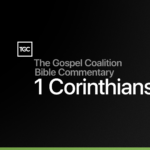But [Stephen], full of the Holy Spirit, gazed into heaven and saw the glory of God, and Jesus standing at the right hand of God, (Acts 7:55).
May [a vision of Your finished story] give me courage to suffer and sacrifice to your glory with the joy given by the Holy Spirit. – Scotty Smith, Heavenward, Monday, April 19, 2010.
I was struck by the words of Scotty Smith’s prayer in this past Monday’s blog post. Over the last three years, I have sought the Lord repeatedly for an increase in my courage. For the greater part of my Christian life, I did not understand the significance of courage in the process of Christian growth. By not exercising a good measure of courage early on in my previous pastoral work, I myself was a major factor in the rise of forceful personalities against me that eventually were used of the Lord in my dismissal from my first pastorate. Now, as a church-planting shepherd, I am in need of even more courage than I was as a revitalization pastor at an established church – contra the words of great jest about the wimpy nature of church-planters in the title of the new book by my Washington, DC-area colleague, Mike McKinley. (Touché, Mike! You can get me back at our lunch meeting in June.)
Just this week, I faced what had the potential to be the first major conflict at our 16-month old church work. In the plan of God, I also had been preparing a sermon on the witness of Stephen in Acts 7:54-8:1. Scotty’s plea to the Lord resonated with my meditations in this passage: Stephen had the very sort of courage for which Scotty had prayed! Stephen had the “courage to suffer and sacrifice to [Christ’s] glory with the joy given by the Holy Spirit.” (Would it be too much of a stretch to imagine that Stephen’s witness was one of many things that informed Paul’s understanding of “[overflowing] with hope by the power of the Holy Spirit” in Rom. 15:13?)
It was this understanding of the character of Stephen that helped me to see something important about the type of courage needed in pastoral work. My previous prayers for courage envisioned something of an immovable object (Spirit-filled courage) meeting an unstoppable force (harsh pastoral challenges or attacks) with the immovable object being the lone survivor of the collision. However, what I now envision is that the Lord will give me grace to be like an immovable object that would voluntarily leave its moorings if necessary, not out of fear of the pain of a collision with unstoppable forces, but in order to readily embrace the pain of the unstoppable forces, because that is what the Immovable Object intends to do for the sake of the Gospel in the lives of believers. Cross-carrying is not for wimps.
By his Spirit-filled courage, which came through “a vision of [His] finished story,” Stephen glorified Christ before hostile unbelievers in four ways:
- He proclaimed the glory of the Resurrected One and his rule from heaven (Acts 7:56).
- He accepted martyrdom by mob justice, outside of the city as did his Lord (7:58; cf. Lk. 23:33; Jn. 19:17).
- He entrusted his soul into the hands of God, as did Christ on the Cross (7:59; cf. Lk. 23:46).
- He made intercession for mercy upon his enemies in the model of Christ (7:60; cf. Lk. 23:34).
Exercising the right kind of courage, Stephen went to sleep pleasing Christ. Our people need to see the same example of “courage to suffer and sacrifice” for the glory of Christ in their shepherds. Such an example will portray for them one aspect of how to live out the vision of the finished story. This vision appropriately prepared me to face a potentially damaging conflict—one of which the Lord, instead, gave our congregation sustaining grace, mercy, and peace.
Is there enough evidence for us to believe the Gospels?
 In an age of faith deconstruction and skepticism about the Bible’s authority, it’s common to hear claims that the Gospels are unreliable propaganda. And if the Gospels are shown to be historically unreliable, the whole foundation of Christianity begins to crumble.
In an age of faith deconstruction and skepticism about the Bible’s authority, it’s common to hear claims that the Gospels are unreliable propaganda. And if the Gospels are shown to be historically unreliable, the whole foundation of Christianity begins to crumble.


































